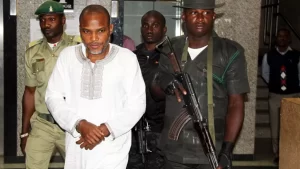In a significant development, Nigeria’s Supreme Court has overturned a lower court ruling and reinstated terrorism charges against a prominent separatist leader. Nnamdi Kanu, the leader of the Indigenous People of Biafra (IPOB) separatist group, has been at the center of a trial that has sparked violence in the country’s southeast region.

Nnamdi Kanu has been in and out of jail since 2015 when he was first arrested and charged with terrorism and treason. His trial has been a contentious issue, with his supporters claiming that he is being unjustly targeted by the government to suppress the group’s separatist campaign.
The Supreme Court’s decision comes after a lower court dismissed the terrorism charges against Kanu. However, the Supreme Court ruled that Kanu still faces terrorism charges brought against him by the national government, further complicating his fate.
Justice Garba Mohammed, in announcing the decision, acknowledged that Nigeria’s secret police had violated Kanu’s rights during his arrest and extradition from Kenya in 2021. However, the Court of Appeal’s ruling in October last year, which dismissed the charges based on the violation, was deemed incorrect by the Supreme Court. The Supreme Court stated that no legislation in the country stripped the trial court of jurisdiction to proceed with Kanu’s case, despite the illegal actions of the secret police.
The reinstatement of terrorism charges against Kanu has significant implications for his trial and the ongoing separatist movement in Nigeria’s southeast region. Kanu, who also holds British citizenship, has already pleaded not guilty to the charges. His trial is expected to resume next year.
Kanu’s supporters have accused the government of targeting him unfairly and using the charges to suppress their campaign for an independent state of Biafra. The IPOB’s separatist movement follows the short-lived Republic of Biafra, which fought a civil war from 1967 to 1970 in an attempt to gain independence from Nigeria. The conflict resulted in the deaths of an estimated 1 million people, primarily from the southeastern region.
The Nigerian government has consistently maintained that the country’s unity is “not negotiable” and has accused Kanu’s group of instigating violence in the southeast. The government has cited instances of lockdowns and targeted attacks on prominent individuals in the region as evidence of IPOB’s involvement in the violence. The group, however, denies these allegations.
The Supreme Court’s decision to reinstate terrorism charges against Nnamdi Kanu, the leader of the IPOB separatist group, has further complicated his trial and the separatist movement in Nigeria’s southeast region. The ruling highlights the ongoing tensions between the government and those advocating for the independence of Biafra. The trial is expected to resume next year, and its outcome will have significant implications for the future of the region.

